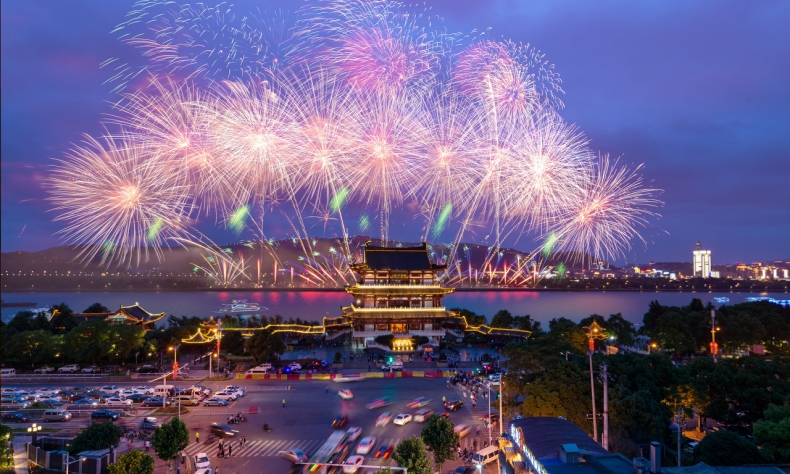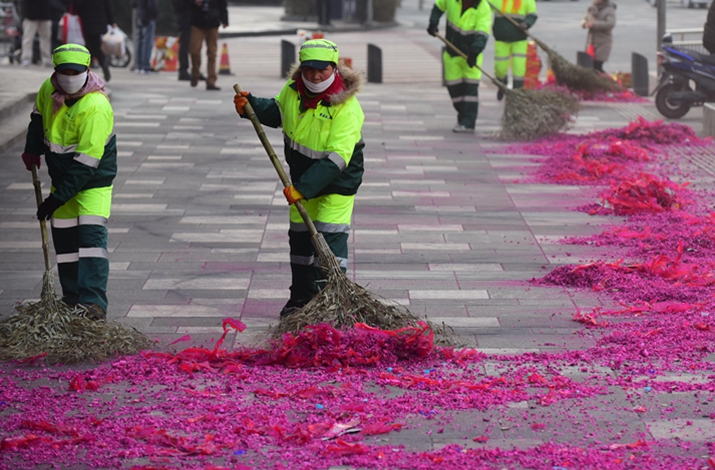
Memories of Fireworks in China
The correlation between fireworks and pollution fatally damaged the image of fireworks that had been admired since ancient times. PM2.5 made them lose their shine and those who lit them felt uneasy and hesitant.
The Disneyland fireworks show is a spectacle. Yet it is nothing compared to the holiday fun in Beijing’s suburbs that is only a memory now. The Chinese people, inventors of fireworks, are masters of lighting up the sky. It was hard to imagine the Spring Festival being celebrated without all the ear-splitting bangs and bedazzling blazes.
The ritual continued every lunar year in cities and villages. People took it for granted though it could occasionally lead to casualties. In densely populated downtown areas, deadly injuries and damage to properties were rampant during the holiday season. In Beijing, medical staff and firemen across the city stayed alert all night long. In 1993, the majority of residents agreed that the fireworks constituted a public hazard, and the municipal government banned them inside the Fifth Ring Road.
Still, fireworks sold briskly in the capital. After the lavish festival-eve dinner, many Beijingers would drive outside the Fifth Ring Road. Opening their car trunks, they would gently carry boxes of fireworks out and put them in a row. The boxes were often as big as microwave ovens and seemed heavy from the way they were handled. They came in bright colored packaging with auspicious names printed in the front, such as “Hall Full of Gold and Jade” and “Here Comes Good Fortune.” Residents from the local neighborhoods joined in, bringing their own festive arsenals.
When the clock struck midnight, heralding the Lunar New Year, all of a sudden, hundreds of long lines of firecrackers, 2,000, 5,000 or even 10,000 in a pack, exploded in perfect synchronization, tangling and tumbling on the ground like dragons spitting fire. Thousands of fireworks soared, whistled and burst into full blossom, lighting up the sky as far as eyes could reach. It was 1,000 times more magnificent than the Disneyland show.
Beijing’s suburban extravaganza became history in 2005. With public opinion strongly calling for preserving the tradition of fireworks during the Spring Festival, legislators gave the green light to fireworks downtown. As fireworks became legal in most places, people did not have to gather in designated places to binge any more. Fireworks dotted every corner of the whole city, apart from some firework-free zones.
You could simple go outside your apartment and shoot fireworks up to the sky. It was quite an experience, as you lit the fuse, took one or two steps back, and admired the firework whooshing up in front of your eyes and blazing to its full glory right on top of your head. Janitors and guards held fire extinguishers and brooms, swiftly cleaning up the aftermath mess.
A British colleague who came to Beijing just days ahead of the festival could hardly sleep for a fortnight . Sporadic blasts every night gave him the feeling of living in a war zone.
This situation continued for several years. But from 2011, the public started to view fireworks from a new perspective. PM2.5, particulate matter with a diameter of less than 2.5 microns, became an ugly buzzword. People started to have more awareness of air quality, regarding fireworks as the culprit fouling up the air.
The correlation between fireworks and pollution fatally damaged the image of fireworks that had been admired since ancient times. PM2.5 made them lose their shine and those who lit them felt uneasy and hesitant. Firework sales witnessed a steady downturn. Across the country, thousands of firework factories were closed within a few years.
The year 2017 saw a decisive result in the battle between fireworks and the public demand for blue skies. Beijing residents were regularly using air purifiers indoors and checking the air quality index. Torn between traditional fun and clear air, the public voted for the latter. After 12 years of being allowed in the downtown areas, fireworks were once again exiled to outside the Fifth Ring Road.
The difficulty in finding a store to buy fireworks and then a place to set them off took the fun out of it. One hardcore fan drove several hours to locate a stall, only to be disappointed to find there was nothing that would shoot up in the sky. After purchasing several ground and handle fountains, he became even more disheartened on being asked to set them off at an open ground 50 meters away. He is not a fan anymore.
How fireworks faded out of the festive life in Beijing is a reflection of what happened across the nation. As China experiences rapid development and people enjoy better lives, tradition changes along with time. Regulations accompanying traditions are also modified accordingly, always with a people-centered approach. The public’s priority has been shifting, from tradition and fun to safety and environmental protection, resulting in revised policies.
The 2019 Spring Festival ended on a note of peace and serenity. Fireworks have stopped being an essential part of the celebration and become a fading memory, giving way to safer streets, cleaner air and better sleep. That is how it should be, a fond memory that will not make it hard to breathe.
 Facebook
Facebook
 Twitter
Twitter
 Linkedin
Linkedin
 Google +
Google +











